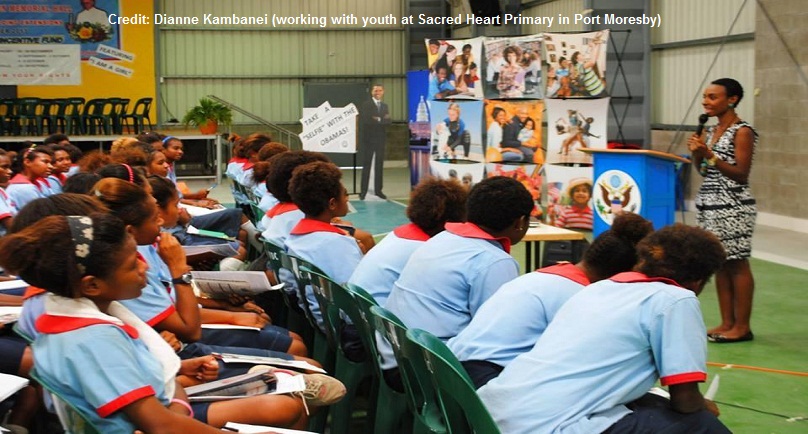By Sasha Pei-Silovo – EM TV Online
Executive Director of PNG’s Young Women’s Christian Association (YWCA), Dianne Kambanei, has expressed disappointment over the lack of participation and representation by the national government at the first Global Youth Forum on Youth Policies in Baku, Azerbaijan.
Although a large percentage of PNG’s populace is comprised of young people, the country is ranked 120 out of 170 countries in the Commonwealth Youth Index (YDI) which measures the status of 15-29 year-olds and gauges youth development according to 15 indicators that are grouped into five key domains: Education, Health and Well-being, Employment, Civic Participation and Political Participation.
It is a comprehensive measure that includes basic needs such as health, nutrition and adequate education, along with secondary needs such as political, economic and social participation.
With PNG ranked as such, it is imperative that the government of the day take appropriate measures to address the issue of youth polices and youth development. By attending the Global Youth Forum on Youth Policies, the nation’s decision and policy makers would have joined other world governments in discussing and responding to key elements on developing guiding principles for youth policy development.
Expressing her concern, Kambanei said “I would like to stress that I am really disappointed that the minister for youth is not here and neither is there anyone from her ministry for youth it’s extremely disappointing if youth and youth policies mattered to our government they should have sent someone here. There are 110 ministers of youths and senior government officials here and sadly it’s just me and Christina from PNG”, she stated.
Kambanei was nominated by the UNDP office in PNG and supported by PNG’s Youth Commissioner, Norit Luio and the Youth Commission to attend the forum, support for which she is grateful for.
Meanwhile, governments of the world, seeing the importance of their youth, have taken the initiative to be at the forum with 165 countries (120 already have a national youth policy in place) present and a total of 115 government youth ministers and senior government officials attending to actively participate in developing youth policies for their young people. With over 700 participants – youth policy practitioners, who will collectively provide a new momentum to evidence based, inclusive, participatory and effective youth policies.
These countries have been praised by the UN for realising the importance of taking a key interest in youth polices as the world’s population is largely made up of young people aged 25 and below.
From the region, Fiji and Australia are duly represented through the Fijian Youth and Sports Minister, Laisenia Bale Tuitubou and four senior government officials; whilst Australia has sent two officials.
The same sentiments were shared by other participants, who revealed to Kambanei that it was disappointing to see that no government officials of PNG had seen the need to attend the forum, which was the first of its kind and high priority on the agenda of governments of the world.
Kambanei travelled to the forum as a panellist and was joined by Christine Giwe, a student, who was selected as an observer at the forum from over 4000 independent applications received. Giwe was one of the 200 fortunate to have been picked to attend the forum as an observer.
Kambanei addressed the forum in the social inclusion panel on Tuesday, day one of the forum. She spoke on the need for young people to be included in policy formulation and evaluation, and the issues young people face, making reference to the commonwealth youth index where PNG is ranked 120 out of 170 nations.
The Global Youth Forum on Youth Policies is convened by the United Nation’s Secretary Envoy on Youth, with UNDP, UNESCO, the Council of Europe and the host country – hosted by the Ministry of Youth and Sports in the Republic of Azerbaijan in the framework of Azerbaijan’s Chairmanship of the Council of Europe’s Committee of Ministers.
The forum aims to address key objectives and related outcomes, and to collectively develop guiding principles for integrated youth policy development, with over 700 participants from 160 countries taking part; bringing together youth policy practitioners, development experts, researchers, youth experts, government ministers, senior government officials, among others.


